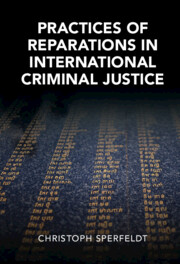Book contents
- Practices of Reparations in International Criminal Justice
- Cambridge Studies in Law and Society
- Practices of Reparations in International Criminal Justice
- Copyright page
- Contents
- Figures
- Tables
- Preface
- Acknowledgements
- Introduction
- Background to the Two Case Studies
- Part I Norm-Making
- Part II Engaging Survivors
- Part III Adjudicating
- Part IV Implementing
- 8 Projectifying
- 9 Receiving and Contesting
- Conclusion
- Bibliography
- Index
- Cambridge Studies in Law and Society
8 - Projectifying
from Part IV - Implementing
Published online by Cambridge University Press: 23 June 2022
- Practices of Reparations in International Criminal Justice
- Cambridge Studies in Law and Society
- Practices of Reparations in International Criminal Justice
- Copyright page
- Contents
- Figures
- Tables
- Preface
- Acknowledgements
- Introduction
- Background to the Two Case Studies
- Part I Norm-Making
- Part II Engaging Survivors
- Part III Adjudicating
- Part IV Implementing
- 8 Projectifying
- 9 Receiving and Contesting
- Conclusion
- Bibliography
- Index
- Cambridge Studies in Law and Society
Summary
In the process of implementation reparations continue to be re-produced and transformed. This chapter explores what happens to reparations when they materialise in the world through ‘projects’. The chapter shows that the growing use of project forms in reparations is not a mere technicality, but a social practice with implications for how reparations are conceived, enacted and experienced. In tracing the development and deployment of project-based approaches to reparations at the ECCC – twenty-four such projects were ultimately recognized by the ECCC’s judges across Case 002 – the chapter discusses the effects of the projectification. It finds that the mobilization of new actors and resources has expanded the possibilities for ECCC reparation. However, a project-based approach also reshaped decision-making and accountability structures underpinning reparation work.
- Type
- Chapter
- Information
- Practices of Reparations in International Criminal Justice , pp. 241 - 273Publisher: Cambridge University PressPrint publication year: 2022

